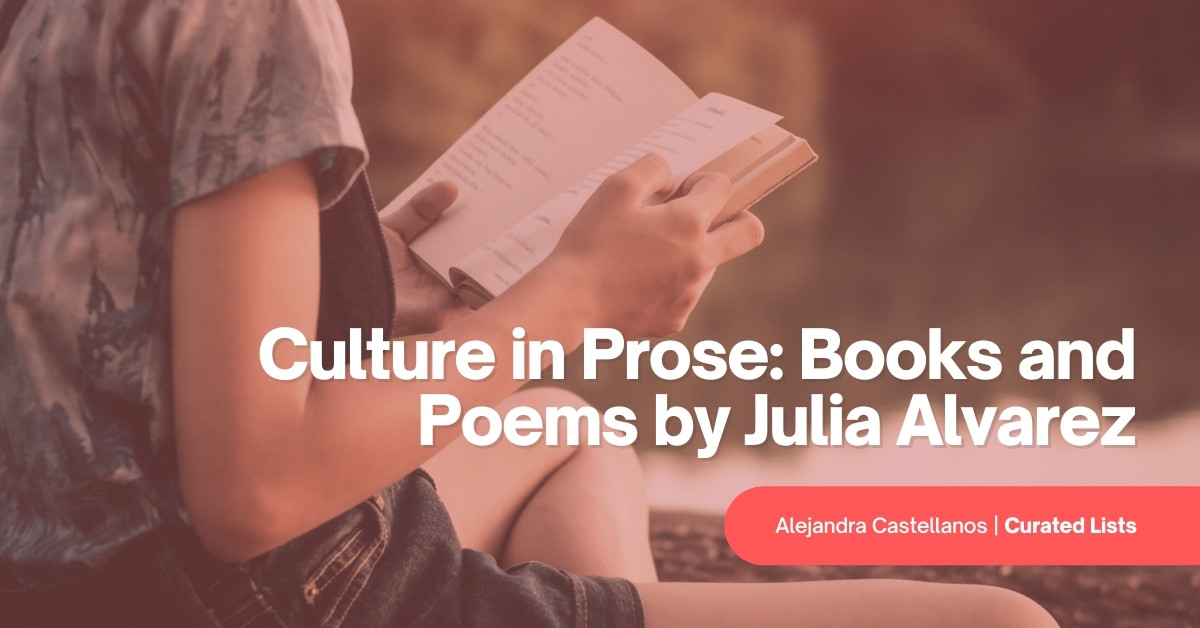
Culture in Prose: Books and Poems by Julia Alvarez
As renowned New York-based novelist, poet, and essayist, Julia Alvarez, states, “A novel is not, after all, a historical document, but a way to travel through the human heart.”
“Una novela no es, después de todo, un documento histórico sino una manera de viajar a través del corazón humano.”
Julia Alvarez’s extraordinary work aims to demonstrate that politics affect everyone—while some benefit from it, others face hardship due to an unfavorable change to their country’s policies.
Reading these original books and poems in Spanish is not only an exploration of the human heart, but a guaranteed way to enhance your Spanish skills!
Benefits of Reading Spanish Literature
Along your learning journey, you’ve encountered multiple methods to immerse in the Spanish language and its culture. Luckily, for book lovers like you and me, literature can amplify your knowledge and passion for this rich language.
Picking a book that catches your eye makes it easier to learn new vocabulary, because you’re motivated to push through it.
Additionally, it provides a realistic use of grammar and semantics in the authentic context of culture and background of the author. You get a first-hand taste of the author’s take on international politics, cultures, traditions, and view on history, which upgrade your learning experience.
Before we dive into Julia Alvarez’s top literature pieces, let’s cover a bit about her as an author.
About Julia Alvarez as an Author
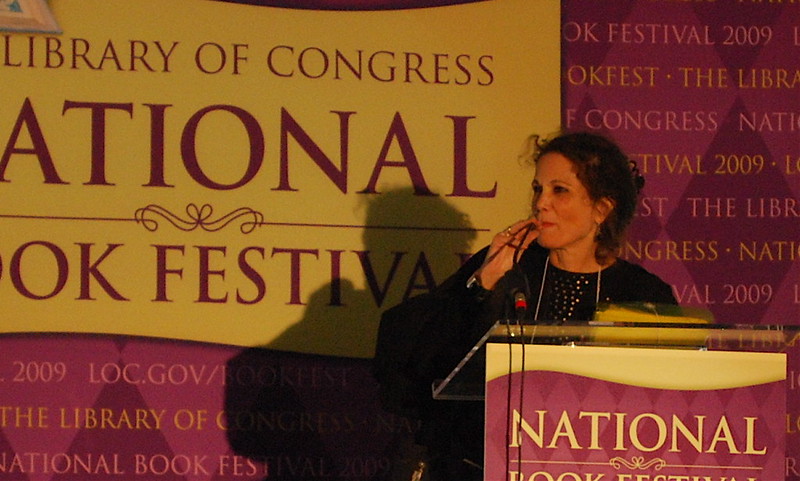
Early Years
They say we’re all destined to end up somewhere, and I believe that’s what happened to Julia Alvarez. She was born in New York in 1950, soon after her parents took her back to their homeland, Dominican Republic. Sadly, ten years later, the political situation was so harsh on the Dominicans that Julia’s parents found themselves returning to the United States.
Motivation
Her writing’s fuel is based on two main factors: her childhood influenced by two cultures, and her country’s political scenario under Rafael Trujillo’s dictatorship, which made her family immigrate to the United States.
Achievements
Her abilities to write emotional and honest stories sparked from historical events, earned her the National Medal of Arts in 2013, from none other than President Barack Obama. Some of her other awards include the F. Scott Fitzgerald Award for Outstanding Achievement in American Literature, and one Vermont Governor’s Award for Excellence in the Arts.
Get ready to dive into Julia Alvarez’s amazing bibliography powered by her memories!
1. Afterlife (Más allá), 2020
- Paperback and Hardcover in English
- E-book in English
- Audible in English
- Paperback in Spanish
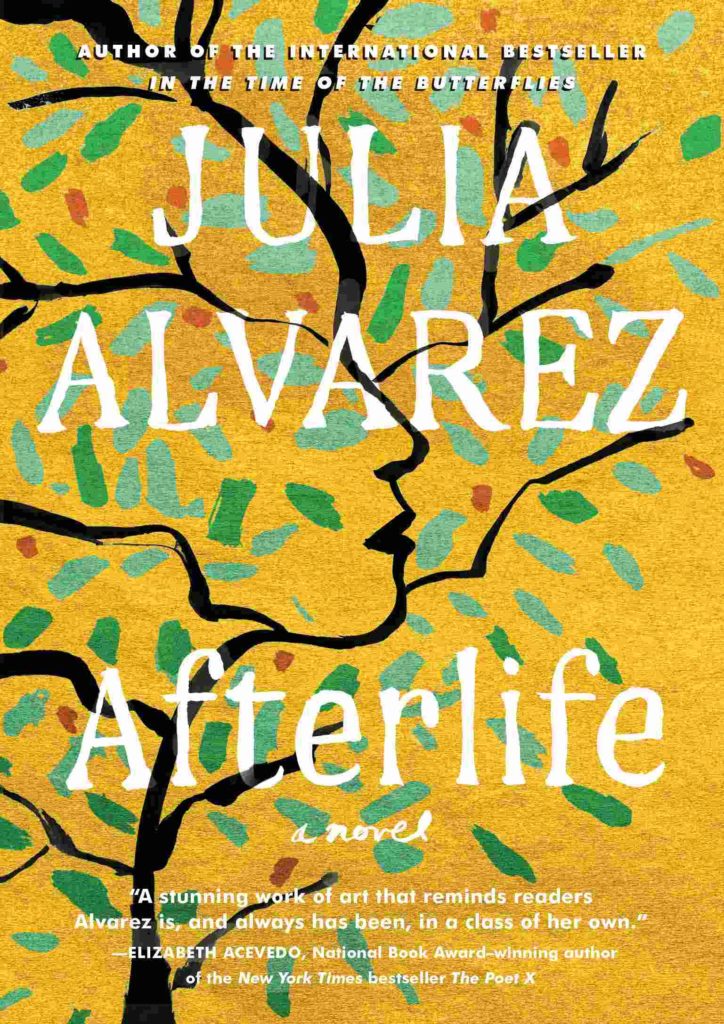
What It’s About
Julia Alvarez explores multiple topics in her first adult book in 15 years. The main character and narrator, Antonia, deals with the loss of her husband along with the aftermath of retirement, and the empathy, or lack thereof, some people acquire in given situations.
Her life is shaken by even more trouble as her sisters approach her with their own scandals. They tell her about Mario and Estela, two immigrants who work next door and happen to owe an enormous amount of money due to an illegal trip into the United States.
Antonia is confused as to what she should do, considering she has emotional issues of her own. Julia stealthily builds a character whose judgment is constantly clouded by her privilege, by the unique opportunity she had of marrying a doctor, and living a comfortable life without dealing with the hardships that other immigrants do. Alvarez goes as far as constructing a segregationist and egotistical mindset in Antonia, as if she had not been part of a world surrounded by two quite different cultures.
Eventually, Antonia’s attitude towards others suffers an inevitable shift as she has to work together with three of her sisters to find one of them that hasn’t communicated at all. The four of them also find themselves almost necessarily involved in Mario and Estela’s issues and must find a way to protect and get Estela home safe.
In conclusion, Antonia questions herself and how much a selfless action can have an impact on someone else’s life, or even an entire community’s situation.
What Others are Saying
The readers enjoy the variety of topics dealt within this book and how it addresses the inherent humanity within all of us. They also agree that this novel has put them in a position to reconsider their ideals and views of the world.
Other reviews claim that she has a strong voice which she makes good use of in her storytelling, and that she has the power of making all of us question the impact of our choices.
2. In the Time of the Butterflies (En el tiempo de las mariposas), 1994
- Paperback and e-book in English
- Audible in English
- Paperback in Spanish
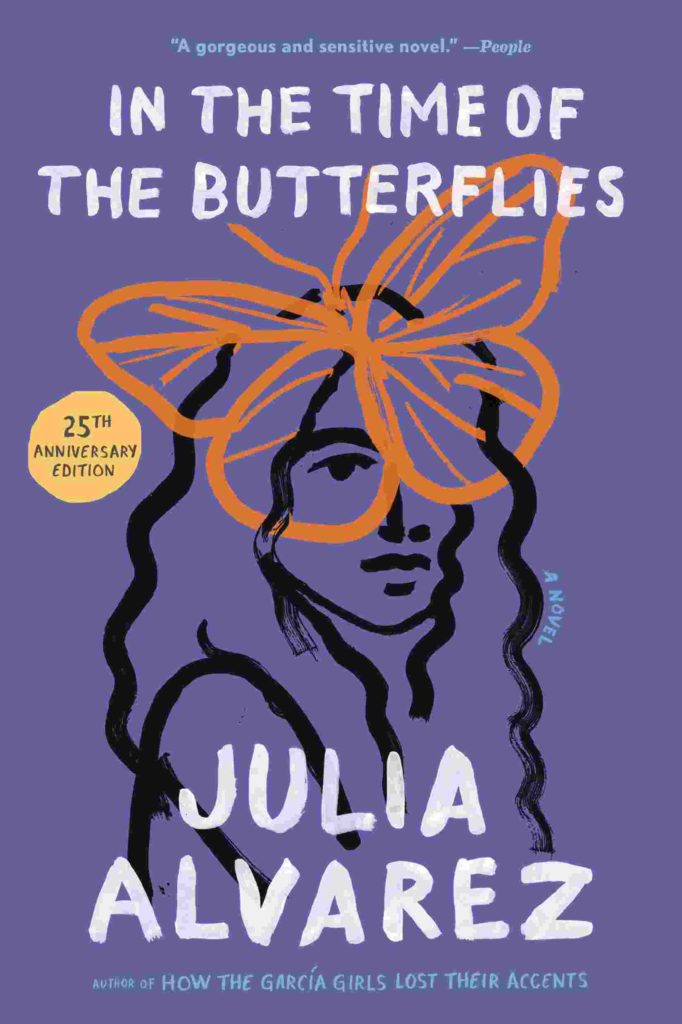
What It’s About
In contrast with Afterlife, Julia Alvarez set In the Time of Butterflies in her homeland, Dominican Republic. Sadly, this raw and captivating novel is based on a true story about four sisters—las Mariposas—that resisted Rafel Trujillo’s government, and it revolves around three of them being murdered due to their beliefs in 1960.
Reported as an accident, the three of them were found at the bottom of a cliff near what appeared to be a jeep that had swerved off the road. The news omitted that there was one sister left alive and that they had been a part of the opposition.
I found this story quite compelling, as it discusses the lives of the four Mirabal sisters, and how their lives were different from each other yet all of them found a way to be an active part of the revolution.
For example, Minerva Mirabal married a leader of the resistance, while Mate Mirabal acted against her husband’s wishes of joining the fight against dictatorship.
It amazed me how the four of them entered the rebellion under different circumstances but stuck together as a family. It saddened me to find that their sorority was so strong that they were killed after their already imprisoned husbands.
Dedé Mirabal, the only Mariposa that survived Trujillo’s army, tells the story to the Dominican-American writer that this novel begins with. Dedé even regrets joining the rebellion last, as she believes she could have done more and probably saved her sisters had she ignored her husband’s opinions some time before.
What Others Are Saying
The Oregonian said that this novel is a “literary treasure”, while the Burlington Free Press describes it as a novel lovely and moving, as well as rich in historical details.
People Magazine assured that it’s a “gorgeous and sensitive novel…A compelling story of courage, patriotism, and familial devotion.”
The readers consider it to be a “beautifully written, heart breaking, and ultimately uplifting book.” They also think the characters are easy to love and to empathize with, and they’re admirable for the way they developed through the years in spite of their obstacles. The book includes themes like family, culture, and revolution in a personal story to the author.
3. How the García Girls Lost Their Accents (De cómo las muchachas García perdieron su acento), 1991
- Paperback and e-book in English
- Audible in English
- Paperback in Spanish
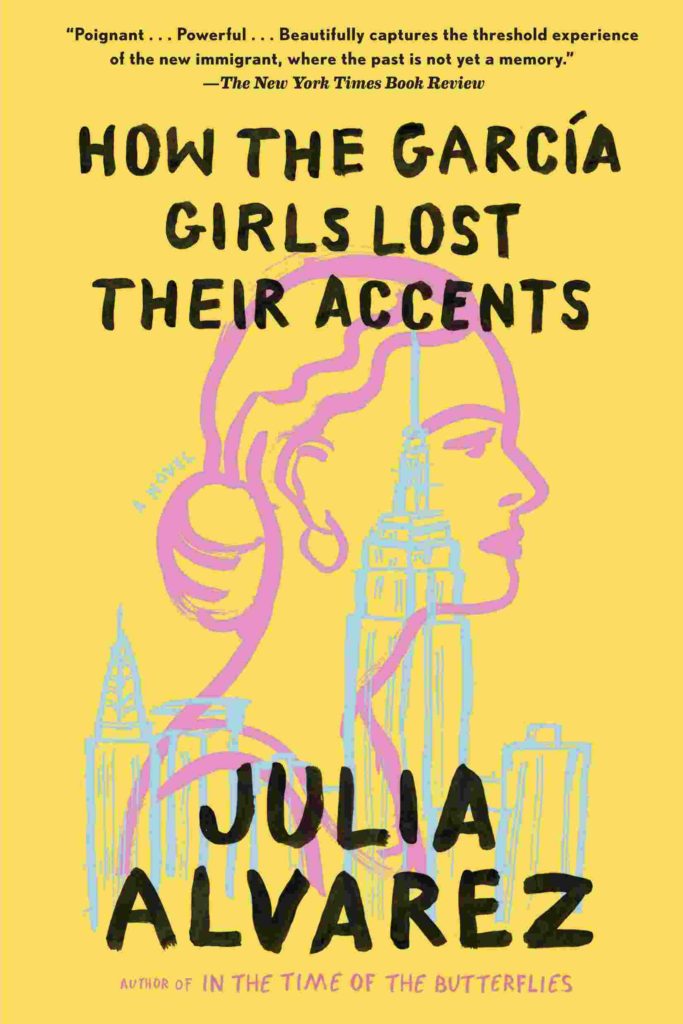
What It’s About
Julia Alvarez’s debut novel explores the acculturation that some immigrants may suffer during the process of leaving their countries. In this case, she focuses on two girls from the Garcia family, both in a rebellious phase towards their parents and their will to leave a country ruled by a dictatorship.
In their attempt to break their ties with their parents, they also risk losing their culture and their traditions. They’re not worried about it at first, as they believe their parents’ ways are too traditional and they don’t agree with them.
The novel introduces Yolanda, whose idea of belonging to the United States’ culture is by diving into the language through an obsession of American Literature. In addition, she intends to erase from her mindset the idea of obeying to any men that crosses her path. She wants to escape the idea she always fought against of saying yes to everything her father said.
On the other side, we have Sofia, whose first impulse to run away from her culture is to literally run off with her boyfriend to Germany. As she changes her address, she changes the Dominican ideas of sexual relationships and instead, adopts the “American” views of this topic.
While for some years her relationship with her father is damaged, she grows older and even gives birth to a kid of her own. With her life changing, she slowly fixes the broken bond she had with her father.
What Others Are Saying
The Washington Post Book World described it as “A clear-eyed look at the insecurity and yearning for a sense of belonging that are a part of the immigrant experience . . . Movingly told.”
The readers enjoyed it for being a beautifully written book that tells a story backwards in a unique way that keeps them entertained. They also claim that it’s moving for being almost autobiographical.
4. Yo! (¡Yo!), 1997
- Paperback and e-book in English
- Hardcover in English
- Paperback in Spanish
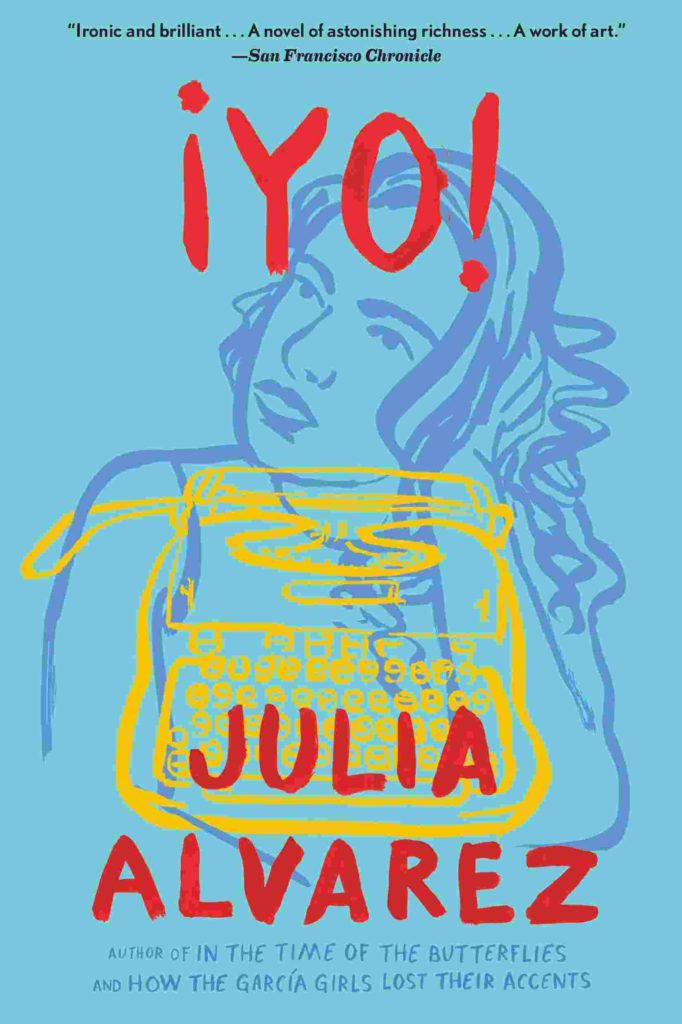
What It’s About
You’ll be glad to know that this is a sequel to How the Garcia Girls Lost Their Accents. This time the focus is set on Yolanda, one of the Garcias and her journey of pursuing her passion of being a poet and a novelist.
She finds herself accused by her own family for exposing their stories through her writing, like that one time when she revealed how her father was hiding a gun in their house during the tough dictatorship times.
Alvarez also dips into Yolanda’s struggle to fit into America and how she excelled at school and found her passion for writing.
As I’ve read about these books, I’ve got to admit that I expected this book to be about Yolanda opening a path for herself and finding her place in the world; I was surprised to discover that in her 30s, she still struggled to find her truth, and to totally dissociate from her Dominican roots.
To be honest, as tough as it sounds for this character, I’m pleased to notice how this book is realistic and more attached to true stories than we imagine.
What Others Are Saying
The main adjective that I found for this book was “funny.” It’s captivating for its warmth and honesty, and the way it discusses serious and complex topics like immigration, acculturation, and the hardships that artists go through trying to tell their own stories.
It’s acclaimed for its accuracy in portraying Julia’s life experiences with passion and truthfulness.
People have seen this novel as original and even nostalgic for approaching Yolanda’s backstory further from different perspectives. They find it fascinating and with a unique method of storytelling.
5. A Cafecito Story (El cuento del cafecito), 2001
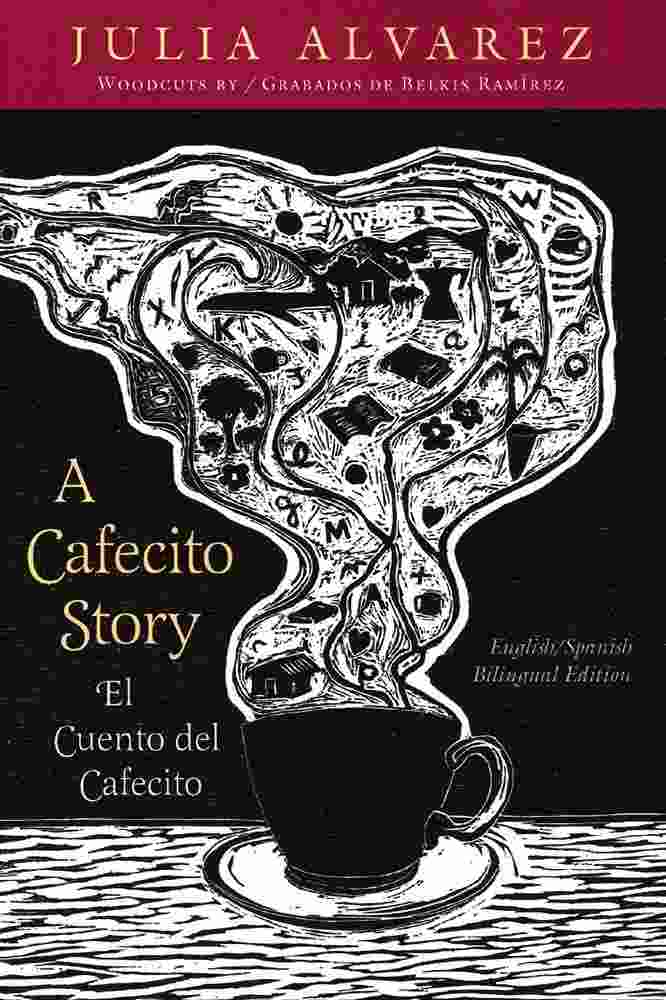
What It’s About
It’s interesting how Julia Alvarez’s preferred and usual topics switch up a bit in this fable about how important it is to stay attached in some way to your roots, to something that reminds you of who you were and who you’ve become. It also describes how impactful our actions can be in our community and our planet.
It talks about the importance of preserving our landscape and fauna, and how it’s possible through the appropriate methods to grow plants or essential foods.
Julia Alvarez points out that humans constantly face dilemmas about what should be more important; the Earth or our needs. She emphasizes that both matter equally and that we are indeed able to live a sustainable life.
What Others Are Saying
The impact of this book relies on its easiness to change people’s mind, to put a stop to their thoughts and reconsider how we could improve the conditions of our current unsustainable methods. Though it’s considered brief and direct, the readers enjoyed Julia’s idea of a wake up call through literature. It’s a quick read that will spark your interest in Julia Alvarez’s books if you’re not familiar with it yet.In the
6. Name of Salomé (En el nombre de Salomé), 2001
- Paperback and Hardcover in English
- E-book in English
- Paperback in Spanish
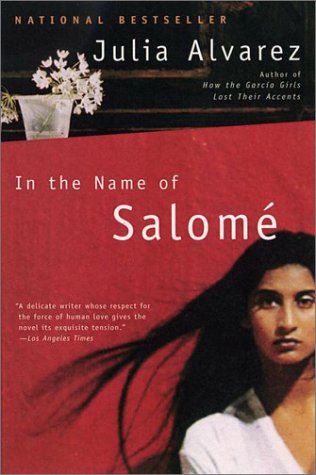
What It’s About
Julia Alvarez travels the world in her writing. This time, she writes about a Dominican-Cuban revolutionary woman with a lot to say.
Camila Henríquez Ureña set her mind and heart to teach in rural areas during Fidel Castro’s rule in Cuba. Camila’s drive for change and rebellious spirit was inherited from her mother to whom she dedicates her every step, Salomé Ureña.
Salomé had her share of well-deserved recognition as a member of the nationalists that fought dictatorships. She was known for her ambitious writing that inspired thousands to stand up to their oppressors.
Camila’s story shapes this feminist novel into a portrayal of the struggles of a family led by a man with urge for power. Her father once was named provisional president, and when he was removed from such post, he could never go back. His insistence in returning to power forced him and his family to flee the country, something Julia Alvarez surely relates to.
What Others are Saying
The New York Times assures this is “Alvarez’s most ambitious work to date.” They highlight her one-of-a-kind ability to merge history and personal experiences in this indisputed art piece.
Her brilliance in merging Camila and Salomé’s stories and combining them into chronological, emotional experiences has beguiled its readers.
7. Saving the World (Para salvar el mundo), 2006
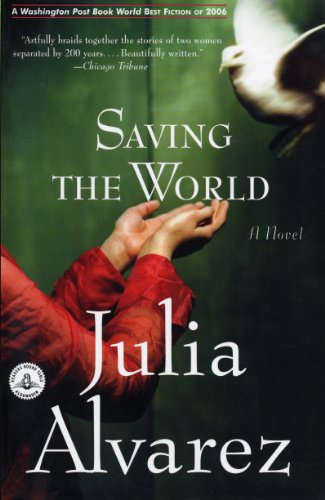
What It’s About
Julia Alvarez brings up another conflict common to authors, writer’s block. Her main character, Alma Huebner, needs to finish writing a new book urgently as her publisher requests another bestseller.
While her husband’s endeavors differ from hers, she finds a story to tell. Snooping into the life of Doctor Francis Xavier, she finds that in the 1800s he seeked to vaccinate people the Spanish were colonizing. Not everything is as it seems, as Francisco required Isabel Sendales y Gómez to search for “live carriers” for the vaccine, choosing twenty-two orphan boys for such a venture.
Alma finds a resemblance in Isabel’s situation, even if it happened two centuries ago. Both women are living under the shadow of medical “altruists” that have no regard for their desires and ambitions.
The engaging twist of the story is when the male figures in the story don’t succeed in either of their plans, in contrast to the new-found direction the female figures embark on.
This unconventional story depicts situations that we’re still living with such as machismo and the thin line between “altruism and ambition.”
What Others are Saying
Readers appreciated that Julia Alvarez took the risk of telling two stories, set apart in time, that shared characters of similar spirits and motivations.
The Washington Post Book World highlighted this book’s success at discussing the human need for belongingness.
The critics brought up how Julia’s novels may differ from each other but, in one way or another, they always point out the way combining small actions can change the world.
The Florida Sun-Sentinel described this author’s style perfectly, saying this novel gives us a good taste of her “creative agility, political insight and spiritual depth.”
Other Notable Works
While we’ve clearly seen Julia Alvarez’s talent in writing full-length novels, she has also channeled her beautiful writing into poetry.
The Woman I Kept to Myself
- Paperback and Hardcover in English
- E-book in English
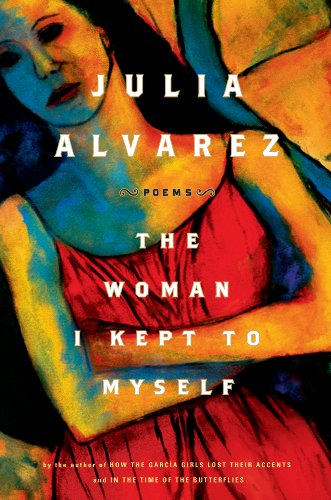
What It’s About
Julia Alvarez compiles 75 poems where her constant topics of merged cultures and immigration are not missing. She also used these works to celebrate and recognize her own achievements and to be proud of who she used to be and has become.
What Others Are Saying
The Miami Herald insists that these poems are a rollercoaster of emotions, wonder, anger, grief, and joy.
This compilation shook the critics as the poems embody the human pursuit of identity and the effect of evident socio-economic differences among cultures on our own perception of ourselves.
Improve Your Opportunities
Learning a new language, one so broadly spoken like Spanish, is much more than a unique experience for your personal life. Knowing a different language opens up a whole new field for job opportunities and a chance to grow professionally and financially.
Those who speak more than one language have a huge chance of earning more money for this sole reason.
Studies show that there are additional earnings from $50,000 to $125,000 that you can aspire to when you are fluent in at least two languages.
No more second thoughts! Sign up for a free class today and practice your Spanish with a native Spanish speaking professional teacher and boost your career!

Want more Spanish resources? Check these out!
- Top 10 Places to Visit in Guatemala City, Guatemala
- 15 Mouth-Watering National Dishes of Latin America
- 60 Best New Year Quotes in Spanish 2024
- The End of the Year Vacation Guide 2023 You Were Looking For
- Top Productivity Apps to Try For Language Learning
- 5 Educational Video Games to Practice Spanish
- Top 10 Hispanic Museums to Visit
- Best Tablets For Kids 2023 Edition
- Christmas Songs and Vocabulary for Kids in Spanish - December 13, 2022
- 100 Sentences With the Spanish Verb Ser - September 1, 2022
- Learn the Shapes (Free Spanish Lessons for Kids) - January 13, 2022




